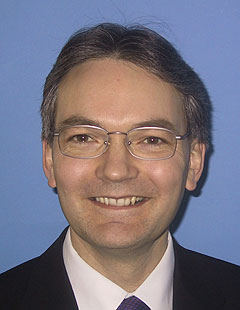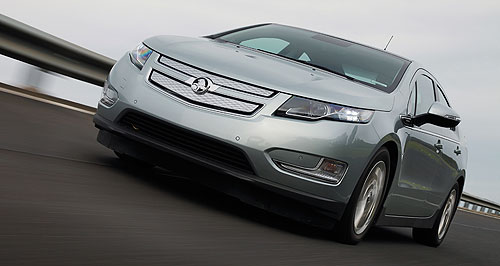News - General News - Electric VehiclesInternal combustion engines to power on: expertSlow start: According to industry expert Professor Neville Jackson, plug-in hybrids like the coming Holden Volt will achieve less than 10 per cent market share by 2020. Research engineer predicts slow take-up of EVs as GM idles Volt production7 Mar 2012 By JOHN MELLOR THE internal combustion engine will be a dominant force in vehicle propulsion “for many decades” despite massive investment being made by car companies worldwide in electric vehicles and plug-in hybrid vehicles, according to an international expert. In an interview with GoAuto, chief technology and innovation officer of Ricardo plc, Neville Jackson, predicted that electric cars would prove popular with city dwellers and first movers who want to be at the forefront of change, but will only achieve around two per cent market share by 2020. He also believes that plug-in hybrids, including range-extender electric cars like the coming Holden Volt, will achieve less than 10 per cent market share by 2020. Prof Jackson’s comments came as General Motors last week revealed it is planning to halt production of the Volt for more than a month to cut back on rising inventories, idling its assembly plant in Michigan from March 19 to April 23. Volt sales in the US rebounded last month to more than 1000 units, having slipped to 600 in January in the wake of an investigation by the National Highway Traffic Safety Administration (NHTSA) into battery fires in the vehicle.  Left: Chief technology and innovation officer of Ricardo plc Neville Jackson. Left: Chief technology and innovation officer of Ricardo plc Neville Jackson.Holden is preparing to launch the Volt – which has since been modified and given a clean bill of health – in the final quarter of this year. Ricardo is one of the world’s major engineering groups working on leading-edge automotive technology, covering everything from re-creating the internal combustion engine to new electric and hybrid electric systems, battery research, the power electronics that control power flows in electric cars and electric hybrids, transmission research and other technology such as flywheel hybrids that have come out of Formula 1 KERS development. The company also manufactures the twin-turbo V8 engine for the McLaren MP4-12C and the transmission for the Bugatti Veyron. Prof Jackson will deliver the keynote address at the Cars of Tomorrow conference, to be held during Automotive Week at the Melbourne Conference and Entertainment Centre on Wednesday, March 14. He told us that EVs and hybrids would play an important role in helping car-makers meet stringent new emissions and fuel economy regulations being demanded by governments around the world. However, he said car manufacturers were also finding developments being made in internal combustion (IC) engine design are far more cost-effective than EVs. “The challenge we have, particularly with batteries, is that power electronics are very expensive,” Prof Jackson told GoAuto. “So we have to be as efficient as we can with how we use them and therefore we only want to use as much of that electrical equipment as we need to meet a specific target. “To go to a full hybrid is a very expensive option and it is not the most cost-effective way to deliver fuel economy.” He said a large number of car makers were working on very small IC engines with clever boost systems as a solution to meeting government rules in a move that would turn engine design on its head. “When you take a C-class (small-segment) car like a Focus or Astra, two of the main sellers in Europe, it takes about 3kW to drive the vehicle along the road at 30mph (50km/h). Yet we fit an engine to that vehicle with between 80 and 100kW. But we are only using a few per cent of its power when we are driving along a straight road. “What we are trying to do is design an engine that is much more efficient when you are only producing 3kW but can still produce 100kW when you need to. “So we are taking a very, very small engine that occasionally thinks it is a big engine that can produce a lot of power. We will need clever and more and more sophisticated boost systems (including electric superchargers and turbochargers) to make that engine perform like a big engine when required.” Prof Jackson said the key attraction of the smaller engine was reduced friction rather than reduced engine capacity or lighter weight. “When the engine is producing 3kW, it may have to overcome 4-5kW of friction to deliver that 3kW. That is the struggle. If you can reduce the friction by even a few kilowatts there is a massive change in fuel consumption at that kind of level of power output and we are doing that by reducing the capacity of the engine. “A small engine would have half the friction of a 2.0-litre engine,” he said.  Read more |
Click to shareGeneral News articlesResearch General News Motor industry news |

















Facebook Twitter Instagram